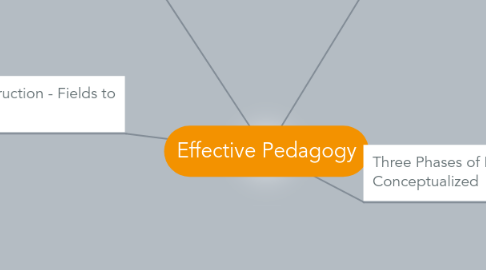
1. Phases of Instruction - Areas in Need of Theoretical Elaboration
1.1. Pre-Engagement
1.1.1. It is important to find more evidence that pre-engagement activities increase the success rate or lead to successful engagement.
1.2. Engagement
1.2.1. The most difficult task is creating a curriculum that will keep different adult learners interested in the subject matter.
1.3. Post-Engagement
1.3.1. For post-engagement, decided what is the best method of assessment for the course is important. Instructors will need to view both the students results and their own paths.
2. Phases of Instruction - Fields to Activities
2.1. The Fields of Adult Education and Educational Psychology in connection with the Phases of Instruction: Pre-Engagement, Engagement, Post-Engagement
2.1.1. For Adult Education, in dealing with the instruction of adults, the activities must be considered. The Instructor must understand who their learner is and approach Instruction from that knowledge.
2.1.2. For Educational Psychology, in dealing with the exploration of all of the fields of Instruction, the Instructor must consider the effectiveness of each phase.
3. Phases of Instruction - Relevance of Success to Teaching-Learning Effort
3.1. Pre-Engagement
3.1.1. This phase is dealing with preparation for the course which may include needs assessments, diagnostics, and grouping (Martinez-Pons, 2003).
3.2. Post-Engagement
3.2.1. For Post-Engagement, assessments can be useful tools throughout the duration of the course. Students and teachers can use this time to help students look at their performance was during the course.
3.3. Engagement
3.3.1. With different activities, Instructors are giving their students an opportunity to apply the objectives of the course.
4. Three Phases of Instruction - Conceptualized
4.1. Pre-Engagement
4.1.1. The Instructor is getting a gauge of where students are.
4.1.2. The Instructor is preparing to engage the student (Martinez-Pons, 2003).
4.2. Post Engagement
4.2.1. This phase includes work and activities given during the duration of the course.
4.2.2. According to Martinez-Pons (2003), "The educator involves the student in this process."
4.3. Engagement
4.3.1. Instructor will find out what students have learned.
4.3.2. The Instructor provides some form of assessment and direction to help improve upon what was taught and how it was taught (Martinez-Pons, 2003).
